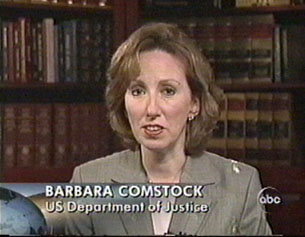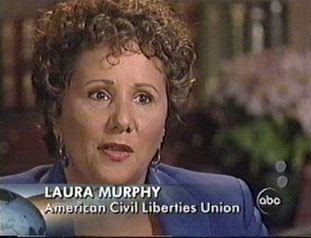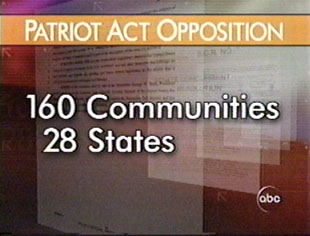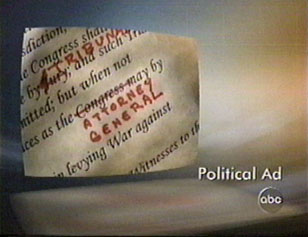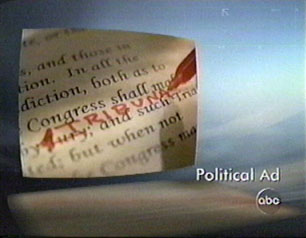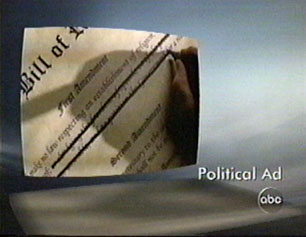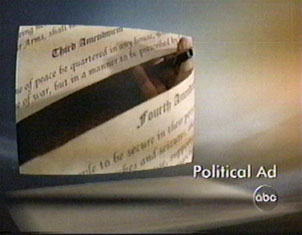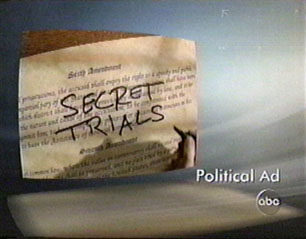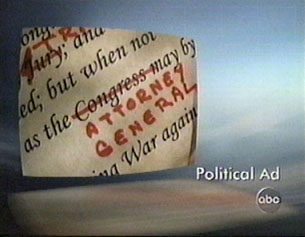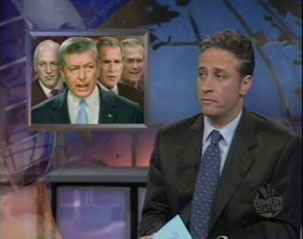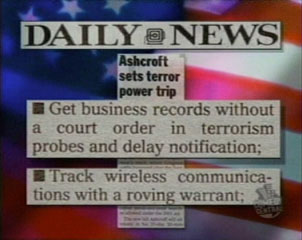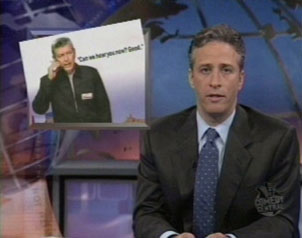Cronkite: The new Inquisition
By Walter Cronkite for the Denver Post.
In his 2 1/2 years in office, Attorney General John Ashcroft has earned himself a remarkable distinction as the Torquemada of American law. Tomas de Torquemada was the 15th century Dominican friar who became the grand inquisitor of the Spanish Inquisition. He was largely responsible for its methods, including torture and the burning of heretics - Muslims in particular.Now, of course, I am not accusing the attorney general of pulling out anyone's fingernails or burning people at the stake (at least I don't know of any such cases). But one does get the sense these days that the old Spaniard's spirit is comfortably at home in Ashcroft's Department of Justice.
The Patriot Act is much in the news, as Ashcroft and his minions seek both to justify its excesses and strengthen them, thus intensifying its dangerous infringements on the Bill of Rights.
There was something almost medieval in the treatment of Muslim suspects in the aftermath of Sept. 11. Many were held incommunicado, without effective counsel and without ever being charged, not for days or weeks, but for months or longer, some under harsh conditions designed for the most dangerous criminals.
It was in the spirit of the Inquisition that the Justice Department announced recently that it would begin gathering data on judges who give sentences lighter than called for by legislative guidelines.
Nothing so clearly evokes Torquemada's spirit as Ashcroft's penchant for overruling U.S. attorneys who have sought lesser penalties in capital cases. The attorney general has done this at least 30 times since he took office, according to the Federal Death Penalty Resource Counsel. In several cases, Ashcroft actually has overturned plea bargains negotiated by those government prosecutors.
The New York Times editorialized that the attorney general seems to want the death penalty used more often.
Ashcroft is not alone in this. His boss, while governor of Texas, seemed never to have met a death sentence he didn't like. The two of them represent a subdivision of the Republican Party known as the "social conservatives," who often have favored the use of government power to police moral issues they view as modern heresies, such as abortion, homosexuality and obscenity. They contrast with those Republicans who tend to resist such uses of federal power and can generally be counted on to defend individual rights.
What makes this administration's legal bloodthirstiness particularly alarming is the almost religious zeal that seems to drive it. So, what we are seeing now is a confluence of two streams of American thought. One of those streams represents those who believe security must have priority over civil rights. The other stream represents those who believe that civil rights must be preserved even as we prosecute to the hilt the war on terrorism.
Our liberty could drown in the resultant turbulence of these colliding currents.
Here is the full text of the article in case the link goes bad:
http://www.denverpost.com/Stories/0,1413,36~29003~1640999,00.html
walter cronkite
Cronkite: The new Inquisition
By Walter Cronkite
President Bush's televised answer to the growing concerns of many - including some Republicans - about the powers granted to him in the USA Patriot Act was to ask for even stronger measures, particularly the expanded use of "nonjudicial subpoenas." That means a federal agency such as the FBI can write its own subpoenas to conduct a search - no judges needed.
Unfortunately, security and liberty form a zero-sum equation. The inevitable trade-off: To increase security is to decrease liberty and vice versa. In the past, such trade-offs have been temporary - for the duration of the crisis of the moment. But today, we cannot see an end to the War on Terrorism, and that forces us to decide how secure we have to be and how free we want to be.
By delivering the speech last week himself, Bush added presidential heft to the issue and took some of the heat off of his attorney general, who is seen by many as the heedless champion of security at any price.
In his 2 1/2 years in office, Attorney General John Ashcroft has earned himself a remarkable distinction as the Torquemada of American law. Tomas de Torquemada was the 15th century Dominican friar who became the grand inquisitor of the Spanish Inquisition. He was largely responsible for its methods, including torture and the burning of heretics - Muslims in particular.
Now, of course, I am not accusing the attorney general of pulling out anyone's fingernails or burning people at the stake (at least I don't know of any such cases). But one does get the sense these days that the old Spaniard's spirit is comfortably at home in Ashcroft's Department of Justice.
The Patriot Act is much in the news, as Ashcroft and his minions seek both to justify its excesses and strengthen them, thus intensifying its dangerous infringements on the Bill of Rights.
There was something almost medieval in the treatment of Muslim suspects in the aftermath of Sept. 11. Many were held incommunicado, without effective counsel and without ever being charged, not for days or weeks, but for months or longer, some under harsh conditions designed for the most dangerous criminals.
It was in the spirit of the Inquisition that the Justice Department announced recently that it would begin gathering data on judges who give sentences lighter than called for by legislative guidelines.
Nothing so clearly evokes Torquemada's spirit as Ashcroft's penchant for overruling U.S. attorneys who have sought lesser penalties in capital cases. The attorney general has done this at least 30 times since he took office, according to the Federal Death Penalty Resource Counsel. In several cases, Ashcroft actually has overturned plea bargains negotiated by those government prosecutors.
The New York Times editorialized that the attorney general seems to want the death penalty used more often.
Ashcroft is not alone in this. His boss, while governor of Texas, seemed never to have met a death sentence he didn't like. The two of them represent a subdivision of the Republican Party known as the "social conservatives," who often have favored the use of government power to police moral issues they view as modern heresies, such as abortion, homosexuality and obscenity. They contrast with those Republicans who tend to resist such uses of federal power and can generally be counted on to defend individual rights.
What makes this administration's legal bloodthirstiness particularly alarming is the almost religious zeal that seems to drive it. So, what we are seeing now is a confluence of two streams of American thought. One of those streams represents those who believe security must have priority over civil rights. The other stream represents those who believe that civil rights must be preserved even as we prosecute to the hilt the war on terrorism.
Our liberty could drown in the resultant turbulence of these colliding currents.
Walter Cronkite has been a journalist for more than 60 years, including 19 as anchor of the CBS Evening News.
Ashcroft slams critics as Patriot Act backlash grows
By Tom Regan for the Christian Science Monitor.
The attorney general continues to insist that the Act "respects rights and increases security." USA Today looks at how the Act is at the heart of Ashcroft's powers as attorney general.There are also some people who don't think Ashcroft and the Patriot Act have gone far enough. They would like to see a halt to all immigration of any kind, for instance, as a better way to prevent terrorism.
Delaware Online reports that Patriot Act "abuses," however, are starting to surface. People with no connection to any form of criminal activity say that they are being deprived of the right to open bank accounts, get credit cards, etc. because of the Patriot Act.
Shortly after he graduated from college in May, French Clements of San Jose, Calif., tried to open an online brokerage account with Harrisdirect, where his stepfather has an account. A day after he completed the online application, however, he got a brief e-mail from Harrisdirect saying, "We regret to inform you that we are unable to approve your application at this time: The customer's identity not properly authenticated per the USA Patriot Act." Clements was stunned, and so was his mother, Alayne Yellum. "Maybe they don't like people named French," she says...
Critics of the Patriot Act also point out that it is now being used in other areas of law enforcement.
"Within six months of passing the Patriot Act, the Justice Department was conducting seminars on how to stretch the new wiretapping provisions to extend them beyond terror cases," said Dan Dodson, a spokesman for the National Association of Criminal Defense Attorneys. "They say they want the Patriot Act to fight terrorism, then, within six months, they are teaching their people how to use it on ordinary citizens."...
An analysis of the act, as it is being implemented by the federal government and subtly revised by the courts, indicates that so far it has not threatened the civil liberties of millions as some claim but neither has its use avoided unintended consequences and damage to innocent lives. The problem is that because of government secrecy – the fate of some Muslim-Americans rounded up since 9/11 is still unknown – it is difficult to know exactly how the law is being enforced.
Finally, it seems that Ashcroft is having some legal problems of his own. On Friday his department filed a brief saying that he shouldn't be required to appear in a Michigan federal court to explain why he violated a judge's gag order in place during a terrorism trial. Ashcroft is accused of violating a court order when he praised government informant Youssef Hmimssa during an April 17 news conference. At the news conference, Ashcroft called Youssef Hmimssa's cooperation "a critical tool" in efforts to combat terrorism.
Here is the full text of the article in case the link goes bad:
http://search.csmonitor.com/search_content/0916/dailyUpdate.html
Daily Update
By Tom Regan | csmonitor.com
Sign up to be notified daily:
updated 1:00 p.m. ET September 16, 2003
Ashcroft slams critics as Patriot Act backlash grows
The war of words over the USA Patriot Act heated up considerably over the past few days, thanks in part to a recently completed "Patriot Act Tour" conducted by US Attorney General John Ashcroft. The tour, conducted in front of small, law enforcement friendly audiences, excluded participation from the general public. (At Faneuil Hall in Boston, Ashcroft addressed a crowd of 150, while outside the hall a crowd of 1200 chanted "This is what democracy looks like.") The tour was designed to create support for the act, but in some ways may have done just the opposite.
One of the main charges critics of the Patriot Act aim against Ashcroft is that rules designed to catch terrorists will be used against ordinary citizens. They also say police and prosecutors will use the laws created by the Patriot Act in other areas of law enforcement. These critics include people from both the left and the right of the American political spectrum.
Ashcroft blasted some of these critics on Monday, taking aim in particular at librarians. The Associated Press reports that Ashcroft said people are being wrongly led to believe that libraries have been "surrounded by the FBI," with agents "dressed in raincoats, dark suits and sunglasses. They stop everyone and interrogate everyone like Joe Friday."
The attorney general continues to insist that the Act "respects rights and increases security." USA Today looks at how the Act is at the heart of Ashcroft's powers as attorney general.
There are also some people who don't think Ashcroft and the Patriot Act have gone far enough. They would like to see a halt to all immigration of any kind, for instance, as a better way to prevent terrorism.
Delaware Online reports that Patriot Act "abuses," however, are starting to surface. People with no connection to any form of criminal activity say that they are being deprived of the right to open bank accounts, get credit cards, etc. because of the Patriot Act.
Shortly after he graduated from college in May, French Clements of San Jose, Calif., tried to open an online brokerage account with Harrisdirect, where his stepfather has an account. A day after he completed the online application, however, he got a brief e-mail from Harrisdirect saying, "We regret to inform you that we are unable to approve your application at this time: The customer's identity not properly authenticated per the USA Patriot Act." Clements was stunned, and so was his mother, Alayne Yellum. "Maybe they don't like people named French," she says.
As evidence of the Act's effectiveness, the Justice Department often points out that 260 individuals have been charged, and that 515 "linked" to the 9/11 investigation have been deported. But the Christian Science Monitor reports that what the government doesn't reveal is that the vast majority of the 260 charged and 515 deported were involved in relatively minor crimes or immigration infraction, and had nothing to do with Al Qaeda or terrorism.
Critics of the Patriot Act also point out that it is now being used in other areas of law enforcement.
"Within six months of passing the Patriot Act, the Justice Department was conducting seminars on how to stretch the new wiretapping provisions to extend them beyond terror cases," said Dan Dodson, a spokesman for the National Association of Criminal Defense Attorneys. "They say they want the Patriot Act to fight terrorism, then, within six months, they are teaching their people how to use it on ordinary citizens."
In one case, a North Carolina county prosecutor charged a man accused of running a methamphetamine lab with breaking a new state law barring the manufacture of chemical weapons. If convicted, Martin Dwayne Miller could get 12 years to life in prison for a crime that usually brings about six months. AP reports that prosecutors are making no apologies for these tactics, saying that while the Patriot Act's primary focus is on terrorism, lawmakers are aware it contains provisions that have been on prosecutors' wish lists for years, and could be used in a wide variety of cases.
It is this idea of law enforcement officials jamming every conceivable thing on their wish lists into the Patriot Act (because they knew a Congress staggered by the 9/11 attacks would pass it), that enrages so many people. The Chicago Sun-Times reports on a recent debate where retired judge, and former Clinton White House Counsel, Abner Mikva said the act is "making us into the Police State of America."
"It's a 342-page bill that changes our immigration laws, privacy laws, security, detention, the entire way the federal government treats its people," Mikva said ... Mikva described it as a grab bag of civil liberties-defying requests from federal prosecutors that he had rejected during the Clinton years. "I was at the White House in 1995, and we were able to get some of the worst provisions excluded from the 1995 act, and they were just dumped wholesale into the Patriot Act," Mikva said.
The growing backlash against the act may make it more difficult for the Bush asministration to get new provisions added to it. The Washington Post reports that President Bush used the second anniversary of the Sept. 11 attacks to call for empowering authorities in terrorist investigations to issue subpoenas without going to grand juries, to hold suspects without bail and to pursue the death penalty in more cases. But The Toledo Blade reports that Bush didn't go as far as Ashcroft wanted, because senior Republican lawmakers had told him many of these new provisions would be "dead on arrival."
As the Blade also points out, knowing whether Ashcroft or his critics views are justified is made more complicated by the Justice Department's refusal to release information about Patriot Act prosecutions.
An analysis of the act, as it is being implemented by the federal government and subtly revised by the courts, indicates that so far it has not threatened the civil liberties of millions as some claim but neither has its use avoided unintended consequences and damage to innocent lives. The problem is that because of government secrecy – the fate of some Muslim-Americans rounded up since 9/11 is still unknown – it is difficult to know exactly how the law is being enforced.
Finally, it seems that Ashcroft is having some legal problems of his own. On Friday his department filed a brief saying that he shouldn't be required to appear in a Michigan federal court to explain why he violated a judge's gag order in place during a terrorism trial. Ashcroft is accused of violating a court order when he praised government informant Youssef Hmimssa during an April 17 news conference. At the news conference, Ashcroft called Youssef Hmimssa's cooperation "a critical tool" in efforts to combat terrorism.
This program was broadcast on September 4, 2003 at 11:30 pm.
Ted Koppel put together an amazing Nightline where he interviewed folks from the ACLU and the Justice Department, among others -- and was able to paint a frighteningly accurate picture of the Patriot Act and its new bastard brother, the Victory Act.
If you've only got a minute, at least watch his closing thoughts on the matter. (Small - 3 MB) (Links to the complete program are located below.)
The men who drafted our constitution, who framed our civil rights and protected our various freedoms under the law would, I suspect, retch at some of the bone headed, self-serving, misinterpretations of their intentions that they so often use these days to undermine the very freedoms they pretend to safeguard. The miracle of American Law is not that it protects popular speech, or the privacy of the powerful, or the homes of the priviledged, but rather, that the least among us, those with the fewest defenses thoses suspected of the worst crimes -- the most despised in our midst, are presumed innocent until proven guilty.That remains as revolutionary a concept now as it was in the 1780s. It makes protecting the country against terrorism excruciatingly difficult, but we cannot arbitrarily suspend the rights of one catagory of suspects without endangering all the others.
Also of particular interest was the interview with Barbara Comstock, Director of Public Affairs for the Justice Department. Ted Koppel wanted to know why everything had to be kept secret. Why your medical records could be obtained without your being notified, etc. She kept bringing up the "al qaeda safe house," which Ted finally told her "your floggin that Al Queda safe house to death Ms. Comstock."
Ted also had to keep correcting Comstock by inserting the word "suspected" when she was talking about who the Patriot Act was being routinely used against. ("Suspected" terrorists and "suspected" enemy combatants.) She just couldn't stop forgetting that these people were only suspects. That whole innocent until proven guilty thing kept slipping her mind.
Here's a partial transcript from the end of the interview. I've created a small clip of this. (Complete versions located below.):
"What I'm asking is, since we are in agreement is that what we are talking about is that these people are people who are "suspects." None of these people is a confirmed terrorist here. If you have a confirmed terrorist, I guarantee you, everyone who is watching tonight is going to applaud you and say "way to go." But we are still dealing with people here who are suspected of something..." Koppel said."Sure." she said.
"..and who therefore presumably have the same rights as any other American citizen, if they are citizens." Koppel said.
Then later...
"How do we define who falls under the provisions of this act as distinct from the normal protections that exist for American citizens? Is it just that you define it? You define someone as being a suspect associated with terrorism? And if you can make a case to a court than you can lift some of the restrictions that would otherwise apply?" Koppel asked.
"Well the restrictions that would otherwise apply are still there. What it is is that we are operating under the same type of legal structures that we have always operated under, but now we're able to..." Comstock said.
"Well not quite. I mean there are some people, obviously, who have been put in jail and who aren't even permitted to have attorneys or who are not permitted to talk with their families. Now we are talking about people who. (stops) Right?" Koppel said.
"That's has nothing to do with the Patriot Act. That's actually "enemy combatants" that are outside the Justice Department per view. And that is the President's authority at war powers." Comstock said.
"Suspected, enemy combatants." Koppel said.
"But those are...actually they've been designated as enemy combatants." Comstock said.
"Well, designated without a trial." Koppel said.
"Yes." She replied.
Here's the whole show in "complete" and "parts 1 and 2" versions:
Nightline - The Patriot Act - Part 1 of 2 (Small - 26 MB)
Nightline - The Patriot Act - Part 1 of 2 (Small - 26 MB)
Nightline - The Patriot Act - Complete (Small - 52 MB)
I've also provided a clip of the cool ACLU commercial that was aired during the broadcast. (Small - 2 MB)
This totally rocks dude:
Victory Act Summer Tour
An Unpatriotic Act
A NY Times Editorial
Attorney General John Ashcroft has embarked on a charm offensive on behalf of the USA Patriot Act. He is traveling the country to rally support for the law, which many people, both liberals and conservatives, consider a dangerous assault on civil liberties. Mr. Ashcroft's efforts to promote the law are misguided. He should abandon the roadshow and spend more time in Washington working with those who want to reform the law.When the Patriot Act raced through Congress after Sept. 11, critics warned that it was an unprecedented expansion of the government's right to spy on ordinary Americans. The more people have learned about the law, the greater the calls have been for overhauling it. One section that has produced particular outrage is the authorization of "sneak and peek" searches, in which the government secretly searches people's homes and delays telling them about the search. The House last month voted 309 to 118 for a Republican-sponsored measure to block the use of federal funds for such searches...
One member of Congress, Representative John Conyers Jr., a Michigan Democrat, has charged that Mr. Ashcroft's lobbying campaign, in which United States attorneys have been asked to participate, may violate the law prohibiting members of the executive branch from engaging in grass-roots lobbying for or against Congressional legislation. Legal or not, the campaign seeks to shore up a deeply flawed piece of legislation. The Patriot Act is the Bush administration's attempt to make the country safe on the cheap. Rather than do the hard work of coming up with effective port security and air cargo checks, and other programs targeted at actual threats, the administration has taken aim at civil liberties.
The administration is clearly worried, as opposition to the excesses of the Patriot Act grows across the country and the political spectrum. Instead of spin-doctoring the problem, Mr. Ashcroft should work with the law's critics to develop a law that respects Americans' fundamental rights.
Here is the full text of the article in case the link goes bad:
http://www.nytimes.com/2003/08/25/opinion/25MON1.html
An Unpatriotic Act
The New York Times | Editorial
Monday 25 August 2003
Attorney General John Ashcroft has embarked on a charm offensive on behalf of the USA Patriot Act. He is traveling the country to rally support for the law, which many people, both liberals and conservatives, consider a dangerous assault on civil liberties. Mr. Ashcroft's efforts to promote the law are misguided. He should abandon the roadshow and spend more time in Washington working with those who want to reform the law.
When the Patriot Act raced through Congress after Sept. 11, critics warned that it was an unprecedented expansion of the government's right to spy on ordinary Americans. The more people have learned about the law, the greater the calls have been for overhauling it. One section that has produced particular outrage is the authorization of "sneak and peek" searches, in which the government secretly searches people's homes and delays telling them about the search. The House last month voted 309 to 118 for a Republican-sponsored measure to block the use of federal funds for such searches.
Congressional opponents of the act, on both sides of the aisle, are pushing for other changes. A Senate bill, sponsored by Lisa Murkowski, an Alaska Republican, and Ron Wyden, an Oregon Democrat, addresses many of the law's most troubling aspects. One provision would make it harder for the government to gain access to sensitive data, including medical and library records, and records concerning the purchase or rental of books, music or videos.
Another change would narrow the definition of "terrorism," so the law's expanded enforcement tools could not be used against domestic political protesters, such as environmentalists and anti-abortion activists, with no link to international terrorism. The bill would also require the government to be more specific about the targets of wiretaps obtained under the law, and would restrict the kind of information that could be collected on Internet and e-mail use.
One member of Congress, Representative John Conyers Jr., a Michigan Democrat, has charged that Mr. Ashcroft's lobbying campaign, in which United States attorneys have been asked to participate, may violate the law prohibiting members of the executive branch from engaging in grass-roots lobbying for or against Congressional legislation. Legal or not, the campaign seeks to shore up a deeply flawed piece of legislation. The Patriot Act is the Bush administration's attempt to make the country safe on the cheap. Rather than do the hard work of coming up with effective port security and air cargo checks, and other programs targeted at actual threats, the administration has taken aim at civil liberties.
The administration is clearly worried, as opposition to the excesses of the Patriot Act grows across the country and the political spectrum. Instead of spin-doctoring the problem, Mr. Ashcroft should work with the law's critics to develop a law that respects Americans' fundamental rights.
This is from the August 21, 2003 program.
Ashcroft's Victory Act Tour (Small - 4 MB)
The Daily Show (The best news on television.)
Sorry for not letting you guys know about this sooner.
It's basically another lunch time activity from 12-2pm at the intersection of Polk and Golden Gate in San Francisco. One block from the Civic Center Bart Station.
There will be a press conference and rally where you can learn more about what's going on and show your support. These events are also excellent opportunities to speak to one of several legal experts personally if you have specific questions.
We've got to fight back swiftly against the travesty of justice that is the Domestic Enhancement Security Act (Patriot II). The very future of our nation, and I believe, the rest of the world, depends on it.
There will be a ton of great speakers there from the ACLU, Refuse and Resist, Amnesty International and many other groups.
Hope to see you there!
Here's the whole message I received:
MEDIA ADVISORY
Sunday, July 6, 2003
CONTACT: Stella Richardson
ACLU
415-621-2493 or Colleen at 510-288-7432Civil Rights and Community Groups Launch Week of Action to Stop **Patriot Act II**
What: Rally to Reclaim Patriotism and Stop **Patriot Act II**
When: Monday July 7th from noon to 2 pm
Where: San Francisco Federal Building, 450 Golden Gate Avenue
Who: Bob Kearney, Associate Director of the American Civil Liberties Union; Matthew Von Saun, Amnesty International; Dave Meserve, Arcada City Council person; Allan Solomonow, American Friends Service Committee; Shahram Agahamir, fired Oakland City worker; Henry Norr, fired SF Chronicle reporter; Ladan Sobhani, Global Exchange; Samena Faheem, American Muslim Voice; Cecilia Chang, Justice for New Americans; Riva Enteen, National Lawyers Guild; Maryjane, Oakland High School student; Rev Michael Yoshi (Buena Vista Methodist Church of Alameda); Colleen Akai, Refuse & Resist!
SAN FRANCISCO ** Following Independence Day celebrations over the July 4th weekend, community organizations will launch a week of action designed to reclaim patriotism and to stop the passage of draft legislation dubbed **Patriot Act II.**
At a July 7th rally, community leaders will call on northern Californians to urge their Members of Congress to prevent the introduction and passage of the proposed **Domestic Security Enhancement Act** (Patriot Act II). They will also urge Congress to fix provisions within the original USA Patriot Act of November 2001 that needlessly erode civil liberties and rights.
Less than two years after Congress passed the USA Patriot Act, giving new, sweeping powers to the federal government to compile information on ordinary Americans, Attorney General John Ashcroft is seeking to introduce legislation that would further erode constitutional checks and balances.
The Domestic Security Enhancement Act would further enhance government powers, eliminating or weakening remaining limits on government surveillance, wiretapping, detention and prosecution.Endorsements:ACLU, Amnesty International; American Muslims Voice; Blue Triangle Network; Global Exchange; SF Gray Panthers; Justice for New Americans; National Lawyers Guild; Tri City CAREs, Tri City Action, Refuse & Resist!; Not In Our Name; Pakistani American...
Attention U.S. Citizens (Yes all of you):
This new and improved Patriot Act will make it legal to strip you of your citizenship without even telling you or anyone else what you're being charged with. You can be denied of ALL your rights (much less your right to due process or a lawyer) and locked up indefinitely.
And what crime might you have committed to cause this to happen?
I'm sorry, that would be classified information. We live in a country of secret laws now. Laws that were voted on by Congress and posted publicly for all to see are a thing of the past.
Everything's changed since 911, you see...
Sure it's unconstitutional. Without a doubt it's unconstitutional.
But it could take years for legislation like this to make its way up through the courts, and if the people being accused and incarcerated under this law aren't allowed to have a laywer and aren't given the right to plead his or her case, how will these cases ever get a chance to work their way anywhere?
Due process and freedom of expression are what used to make the United States "America." We are losing both at a rapid rate.
While we are off "liberating" other countries, our own country and even the most basic of our freedoms are being stolen right out from under our noses.
And all in broad daylight, with everybody watching.
Justice Dept. Drafts Sweeping Expansion of Anti-Terrorism Act
Center Publishes Secret Draft of ‘Patriot II’ Legislation
By Charles Lewis and Adam Mayle for the Center for Public Integrity.
The Bush Administration is preparing a bold, comprehensive sequel to the USA Patriot Act passed in the wake of September 11, 2001, which will give the government broad, sweeping new powers to increase domestic intelligence-gathering, surveillance and law enforcement prerogatives, and simultaneously decrease judicial review and public access to information.
Here is the full text of the entire article in case the link goes bad:
http://www.publicintegrity.org/dtaweb/report.asp?ReportID=502&L1=10&L2=10&L3=0&L4=0&L5=0
The Center for Public Integrity
April 15, 2003
Special Report
Justice Dept. Drafts Sweeping Expansion of Anti-Terrorism Act
Center Publishes Secret Draft of ‘Patriot II’ Legislation
By Charles Lewis and Adam Mayle
(WASHINGTON, Feb. 7, 2003) -- The Bush Administration is preparing a bold, comprehensive sequel to the USA Patriot Act passed in the wake of September 11, 2001, which will give the government broad, sweeping new powers to increase domestic intelligence-gathering, surveillance and law enforcement prerogatives, and simultaneously decrease judicial review and public access to information.
The Center for Public Integrity has obtained a draft, dated January 9, 2003, of this previously undisclosed legislation and is making it available in full text (12 MB). The bill, drafted by the staff of Attorney General John Ashcroft and entitled the Domestic Security Enhancement Act of 2003, has not been officially released by the Department of Justice, although rumors of its development have circulated around the Capitol for the last few months under the name of “the Patriot Act II” in legislative parlance.
“We haven’t heard anything from the Justice Department on updating the Patriot Act,” House Judiciary Committee spokesman Jeff Lungren told the Center. “They haven’t shared their thoughts on that. Obviously, we'd be interested, but we haven’t heard anything at this point.”
Senior members of the Senate Judiciary Committee minority staff have inquired about Patriot II for months and have been told as recently as this week that there is no such legislation being planned.
RELATED DOCUMENTS
The draft of the Domestic Security Enhancement Act of 2003 (12 MB)
Note: Due to high traffic volume, downloading the whole document might take several minutes. To download it in parts, click the links below:
Parts I (4.9 MB)
Part II (1.9 MB)
Part III (1.8 MB)
Part IV (1.8 MB)
Part V (1.9 MB)
Mirror Location of Document:
www.ire.org
The Office of Legislative Affairs “control sheet” which shows that a copy of the bill was sent to Speaker Hastert and Vice President Cheney (157 KB)
Read the Justice Department's response to this report. (230 KB)
Mark Corallo, deputy director of Justice’s Office of Public Affairs, told the Center his office was unaware of the draft. “I have heard people talking about revising the Patriot Act, we are looking to work on things the way we would do with any law,” he said. “We may work to make modifications to protect Americans,” he added. When told that the Center had a copy of the draft legislation, he said, “This is all news to me. I have never heard of this.”
After the Center posted this story, Barbara Comstock, director of public affairs for the Justice Dept., released a statement saying that, "Department staff have not presented any final proposals to either the Attorney General or the White House. It would be premature to speculate on any future decisions, particularly ideas or proposals that are still being discussed at staff levels."
An Office of Legislative Affairs “control sheet” that was obtained by the PBS program "Now With Bill Moyers" seems to indicate that a copy of the bill was sent to Speaker of the House Dennis Hastert and Vice President Richard Cheney on Jan. 10, 2003. “Attached for your review and comment is a draft legislative proposal entitled the ‘Domestice Security Enhancement Act of 2003,’” the memo, sent from “OLP” or Office of Legal Policy, says.
RELATED LINKS
For additional information, visit the web site of PBS' "Now With Bill Moyers". Read the transcript of Moyers' interview with Charles Lewis.
Comstock later told the Center that the draft "is an early discussion draft and it has not been sent to either the Vice President or the Speaker of the House."
Dr. David Cole, Georgetown University Law professor and author of Terrorism and the Constitution, reviewed the draft legislation at the request of the Center, and said that the legislation “raises a lot of serious concerns. It’s troubling that they have gotten this far along and they’ve been telling people there is nothing in the works.” This proposed law, he added, “would radically expand law enforcement and intelligence gathering authorities, reduce or eliminate judicial oversight over surveillance, authorize secret arrests, create a DNA database based on unchecked executive ‘suspicion,’ create new death penalties, and even seek to take American citizenship away from persons who belong to or support disfavored political groups.”
Some of the key provision of the Domestic Security Enhancement Act of 2003 include:
Section 201, “Prohibition of Disclosure of Terrorism Investigation Detainee Information”: Safeguarding the dissemination of information related to national security has been a hallmark of Ashcroft’s first two years in office, and the Domestic Security Enhancement Act of 2003 follows in the footsteps of his October 2001 directive to carefully consider such interest when granting Freedom of Information Act requests. While the October memo simply encouraged FOIA officers to take national security, “protecting sensitive business information and, not least, preserving personal privacy” into account while deciding on requests, the proposed legislation would enhance the department’s ability to deny releasing material on suspected terrorists in government custody through FOIA.
Section 202, “Distribution of ‘Worst Case Scenario’ Information”: This would introduce new FOIA restrictions with regard to the Environmental Protection Agency. As provided for in the Clean Air Act, the EPA requires private companies that use potentially dangerous chemicals must produce a “worst case scenario” report detailing the effect that the release of these controlled substances would have on the surrounding community. Section 202 of this Act would, however, restrict FOIA requests to these reports, which the bill’s drafters refer to as “a roadmap for terrorists.” By reducing public access to “read-only” methods for only those persons “who live and work in the geographical area likely to be affected by a worst-case scenario,” this subtitle would obfuscate an established level of transparency between private industry and the public.
Section 301-306, “Terrorist Identification Database”: These sections would authorize creation of a DNA database on “suspected terrorists,” expansively defined to include association with suspected terrorist groups, and noncitizens suspected of certain crimes or of having supported any group designated as terrorist.
Section 312, “Appropriate Remedies with Respect to Law Enforcement Surveillance Activities”: This section would terminate all state law enforcement consent decrees before Sept. 11, 2001, not related to racial profiling or other civil rights violations, that limit such agencies from gathering information about individuals and organizations. The authors of this statute claim that these consent orders, which were passed as a result of police spying abuses, could impede current terrorism investigations. It would also place substantial restrictions on future court injunctions.
Section 405, “Presumption for Pretrial Detention in Cases Involving Terrorism”: While many people charged with drug offenses punishable by prison terms of 10 years or more are held before their trial without bail, this provision would create a comparable statute for those suspected of terrorist activity. The reasons for presumptively holding suspected terrorists before trial, the Justice Department summary memo states, are clear. “This presumption is warranted because of the unparalleled magnitude of the danger to the United States and its people posed by acts of terrorism, and because terrorism is typically engaged in by groups – many with international connections – that are often in a position to help their members flee or go into hiding.”
Section 501, “Expatriation of Terrorists”: This provision, the drafters say, would establish that an American citizen could be expatriated “if, with the intent to relinquish his nationality, he becomes a member of, or provides material support to, a group that the United Stated has designated as a ‘terrorist organization’.” But whereas a citizen formerly had to state his intent to relinquish his citizenship, the new law affirms that his intent can be “inferred from conduct.” Thus, engaging in the lawful activities of a group designated as a “terrorist organization” by the Attorney General could be presumptive grounds for expatriation.
The Domestic Security Enhancement Act is the latest development in an 18-month trend in which the Bush Administration has sought expanded powers and responsibilities for law enforcement bodies to help counter the threat of terrorism.
The USA Patriot Act, signed into law by President Bush on Oct. 26, 2001, gave law enforcement officials broader authority to conduct electronic surveillance and wiretaps, and gives the president the authority, when the nation is under attack, to confiscate any property within U.S. jurisdiction of anyone believed to be engaging in such attacks. The measure also tightened oversight of financial activities to prevent money laundering and diminish bank secrecy in an effort to disrupt terrorist finances.
It also changed provisions of Foreign Intelligence Surveillance Act, which was passed in 1978 during the Cold War. FISA established a different standard of government oversight and judicial review for “foreign intelligence” surveillance than that applied to traditional domestic law enforcement surveillance.
The USA Patriot Act allowed the Federal Bureau of Investigation to share information gathered in terrorism investigations under the “foreign intelligence” standard with local law enforcement agencies, in essence nullifying the higher standard of oversight that applied to domestic investigations. The USA Patriot Act also amended FISA to permit surveillance under the less rigorous standard whenever “foreign intelligence” was a “significant purpose” rather than the “primary purpose” of an investigation.
The draft legislation goes further in that direction. “In the [USA Patriot Act] we have to break down the wall of foreign intelligence and law enforcement,” Cole said. “Now they want to break down the wall between international terrorism and domestic terrorism.”
In an Oct. 9, 2002, hearing of the Senate Judiciary Subcommittee on Technology, Terrorism, and Government Information, Deputy Assistant Attorney General Alice Fisher testified that Justice had been, “looking at potential proposals on following up on the PATRIOT Act for new tools and we have also been working with different agencies within the government and they are still studying that and hopefully we will continue to work with this committee in the future on new tools that we believe are necessary in the war on terrorism.”
Asked by Sen. Russ Feingold (D-Wis.) whether she could inform the committee of what specific areas Justice was looking at, Fisher replied, “At this point I can’t, I’m sorry. They're studying a lot of different ideas and a lot of different tools that follow up on information sharing and other aspects.”
Assistant Attorney General for Legal Policy Viet Dinh, who was the principal author of the first Patriot Act, told Legal Times last October that there was “an ongoing process to continue evaluating and re-evaluating authorities we have with respect to counterterrorism,” but declined to say whether a new bill was forthcoming.
Former FBI Director William Sessions, who urged caution while Congress considered the USA Patriot Act, did not want to enter the fray concerning a possible successor bill.
"I hate to jump into it, because it's a very delicate thing," Sessions told the Center, without acknowledging whether he knew of any proposed additions or revisions to the additional Patriot bill.
When the first bill was nearing passage in the Congress in late 2001, however, Sessions told Internet site NewsMax.Com that the balance between civil liberties and sufficient intelligence gathering was a difficult one. “First of all, the Attorney General has to justify fully what he’s asking for,” Sessions, who served presidents Reagan and George H.W. Bush as FBI Director from 1987 until 1993, said at the time. “We need to be sure that we provide an effective means to deal with criminality.” At the same time, he said, “we need to be sure that we are mindful of the Constitution, mindful of privacy considerations, but also meet the technological needs we have” to gather intelligence.
Cole found it disturbing that there have been no consultations with Congress on the draft legislation. “It raises a lot of serious concerns and is troubling as a generic matter that they have gotten this far along and tell people that there is nothing in the works. What that suggests is that they’re waiting for a propitious time to introduce it, which might well be when a war is begun. At that time there would be less opportunity for discussion and they’ll have a much stronger hand in saying that they need these right away.”
To write a letter to the editor for publication, e-mail letters@publicintegrity.org. Please include a daytime phone number.
Send us your comments Printer-friendly version
Subscribe to Public i
Enter your e-mail address and click 'Subscribe!' to receive advance notice of Center's reports:
Read the work that won the 2002 Investigative Reporters and Editors national book award. "The scope of this investigation is breathtaking," the judges wrote.
Patriot Act II: Read about the Justice Department's attempt to grab sweeping new powers
Continuing coverage of the 2004 presidential election.
New report on the privatization of drinking water systems.
State Secrets: The Center for Public Integrity, the Center for Responsive Politics and the National Institute on Money in State Politics announce the findings of their year-long study of state party contributions and expenditures.
Buy other center books and reports.
The State Projects is an on-going state-by-state analysis of lawmakers’ conflicts of interest.
ICIJ extends globally the Center's style of "watchdog journalism" in the public interest by marshaling the talents of the world's leading investigative reporters.
Back to Top
Copyright 2002, The Center for Public Integrity. All rights reserved
IMPORTANT: Read our privacy policy and the terms
under which this service is provided to you.
Vanishing Liberties -- Where's the Press?
By Nat Hentoff for the Village Voice.
"If Americans win a war (not just against Saddam Hussein but the longer-term struggle) and lose the Constitution, they will have lost everything." –Lance Morrow, Time, March 17
On March 18, the Associated Press reported that at John Carroll University, in a Cleveland suburb, Justice Antonin Scalia said that "most of the rights you enjoy go way beyond what the Constitution requires" because "the Constitution just sets minimums." Accordingly, in wartime, Scalia emphasized, "the protections will be ratcheted down to the constitutional minimum."
I checked with the Supreme Court for a text of this ominous speech and was told Scalia didn't use a text that night, but the quotation appeared to be accurate. I said, would Justice Scalia let me know? My question was relayed, but I've heard nothing since.
Most of the radical revisions of the Constitution that I and others have been writing about will ultimately be ruled on by the Supreme Court. Scalia indicates he will come down on the side of Bush and Ashcroft. A few days after the terrorist attacks on the World Trade Center and the Pentagon, Justice Sandra Day O'Connor said that as a result, we would have to give up some of our liberties. That's two of nine justices we are not likely to be able to depend on...
Meanwhile, in an invaluable new report by the Lawyers Committee for Human Rights, "Imbalance of Powers: How Changes to U.S. Law and Policy Since 9/11 Erode Human Rights and Civil Liberties" (available by calling 212-845-5200), a section begins: "A mantle of secrecy continues to envelop the executive branch, largely with the acquiescence of Congress and the courts. [This] makes effective oversight impossible, upsetting the constitutional system of checks and balances."
So where is the oversight going to come from? If at all, first from the people pressuring Congress-provided enough of us know what is happening to our rights and liberties. And that requires, as James Madison said, a vigorous press, because the press has been, he noted, "the beneficent source to which the United States owes much of the light which conducted [us] to the ranks of a free and independent nation."
But the media, with few exceptions, are failing to report consistently, and in depth, precisely how Bush and Ashcroft are undermining our fundamental individual liberties...
How many Americans know that if the bill is passed (and Bush certainly won't veto it), they can be stripped of their citizenship if charged with giving "material support" to a group designated by the government as "terrorist"? Sending a check for the outfit's lawful activities-without knowing why it landed on Ashcroft's list-could make you a person without a country and put you behind bars here indefinitely. As Chief Justice Earl Warren said, "you lose the right to have rights" when you lose your citizenship.
Here is the full text of the article in case the link goes bad:
http://villagevoice.com/issues/0316/hentoff.php
Vanishing Liberties -- Where's the Press?
By Nat Hentoff
Village Voice
Friday 11 April 2003
"If Americans win a war (not just against Saddam Hussein but the longer-term struggle) and lose the Constitution, they will have lost everything." –Lance Morrow, Time, March 17
On March 18, the Associated Press reported that at John Carroll University, in a Cleveland suburb, Justice Antonin Scalia said that "most of the rights you enjoy go way beyond what the Constitution requires" because "the Constitution just sets minimums." Accordingly, in wartime, Scalia emphasized, "the protections will be ratcheted down to the constitutional minimum."
I checked with the Supreme Court for a text of this ominous speech and was told Scalia didn't use a text that night, but the quotation appeared to be accurate. I said, would Justice Scalia let me know? My question was relayed, but I've heard nothing since.
Most of the radical revisions of the Constitution that I and others have been writing about will ultimately be ruled on by the Supreme Court. Scalia indicates he will come down on the side of Bush and Ashcroft. A few days after the terrorist attacks on the World Trade Center and the Pentagon, Justice Sandra Day O'Connor said that as a result, we would have to give up some of our liberties. That's two of nine justices we are not likely to be able to depend on.
And in his 1998 book, All the Laws but One: Civil Liberties in Wartime (Knopf/Vintage), the chief justice of the United States, William Rehnquist, admiringly quoted Francis Biddle, Franklin D. Roosevelt's attorney general: "The Constitution has not greatly bothered any wartime president." And Rehnquist himself, who will be presiding over the constitutionality of the Bush-Ashcroft assaults on the Constitution, wrote in the same book:
"In time of war, presidents may act in ways that push their legal authority to its outer limits, if not beyond." And writing of Lincoln's suspending habeas corpus during the Civil War, Rehnquist said, "It is difficult to quarrel with this decision."
Reacting to Rehnquist's deference to the executive branch in previous wars, Adam Cohen, legal affairs writer for The New York Times, wrote: "The people whose liberties are taken away are virtually invisible" in the pages of Rehnquist's book.
Meanwhile, in an invaluable new report by the Lawyers Committee for Human Rights, "Imbalance of Powers: How Changes to U.S. Law and Policy Since 9/11 Erode Human Rights and Civil Liberties" (available by calling 212-845-5200), a section begins: "A mantle of secrecy continues to envelop the executive branch, largely with the acquiescence of Congress and the courts. [This] makes effective oversight impossible, upsetting the constitutional system of checks and balances."
So where is the oversight going to come from? If at all, first from the people pressuring Congress-provided enough of us know what is happening to our rights and liberties. And that requires, as James Madison said, a vigorous press, because the press has been, he noted, "the beneficent source to which the United States owes much of the light which conducted [us] to the ranks of a free and independent nation."
But the media, with few exceptions, are failing to report consistently, and in depth, precisely how Bush and Ashcroft are undermining our fundamental individual liberties.
For example, in writing here about the Justice Department's proposed sequel to the Patriot Act (titled inoffensively the Domestic Security Enhancement Act), I noted that it had been kept secret from Congress. A week before it was leaked by
an understandably anonymous member of Ashcroft's staff, a representative of the Justice Department even lied to the Senate Judiciary Committee about its very existence.
A few sections in that chilling 86-page draft were briefly covered in some of the media. But as I predicted after providing more details here ("Ashcroft Out of Control" and "Red Alert for the Bill of Rights"), these invasions of the Constitution were only a one- or two-day story in nearly all of the media.
How many Americans know that if the bill is passed (and Bush certainly won't veto it), they can be stripped of their citizenship if charged with giving "material support" to a group designated by the government as "terrorist"? Sending a check for the outfit's lawful activities-without knowing why it landed on Ashcroft's list-could make you a person without a country and put you behind bars here indefinitely. As Chief Justice Earl Warren said, "you lose the right to have rights" when you lose your citizenship.
How many Americans know that the FBI can get a warrant from the secret Foreign Intelligence Surveillance Court and go to a library or bookstore to find out what books you read or borrow if you are somehow, according to the FBI, connected to "terrorism"?
In the First Amendment Center's "Legal Watch" newsletter (March 11-17), Charles Haynes writes that "a warning sign greets patrons entering all 10 of the county libraries in Santa Cruz, California." It says: "Beware, a record of the books you borrow may end up in the hands of the FBI. And if the FBI requests your records, librarians are prohibited by law from telling you about it." The message to the readers ends: "Questions about this policy should be directed to Attorney General John Ashcroft, Department of Justice, Washington, D.C. 20530."
Librarians-and bookstore owners-are also forbidden by this section of the law from telling the press of these visits by the FBI to inform John Ashcroft of what people on the list of suspects are reading.
I've checked with the American Library Association and am told that very few other libraries are warning their patrons to be cautious about which books they ask for. Shouldn't the press spread the news of this risk more widely?
And I've seen little in the media about a bill, "The Freedom to Read Protection Act of 2003," introduced in the House by Bernie Sanders (Independent, Vermont) that prevents the government from "searching for, or seizing from, a bookseller
or library . . . materials that contain personally identifiable information concerning a patron of a bookseller or library." Under the bill, a higher standard than mere FBI suspicion will be required.
How many of you know the answer Assistant Attorney General Daniel J. Bryant sent Democratic senator Patrick Leahy of Vermont about our expectation of privacy in bookstores and libraries?
"Any [such] right of privacy," says the Justice Department, "is necessarily and inherently limited since . . . the patron is reposing that information in the library or bookstore and assumes the risk that the entity may disclose it to another."
Have you ever assumed that the librarian or bookstore owner has a right to bypass your First Amendment right to read what you choose by telling "another" (the FBI) whether you read, for example, the Voice? Senator Leahy's office made that Justice Department letter available to the press. Have you seen it before now?

